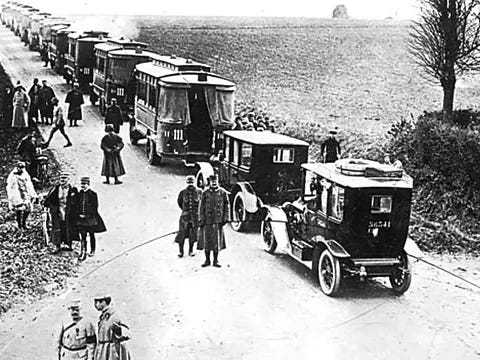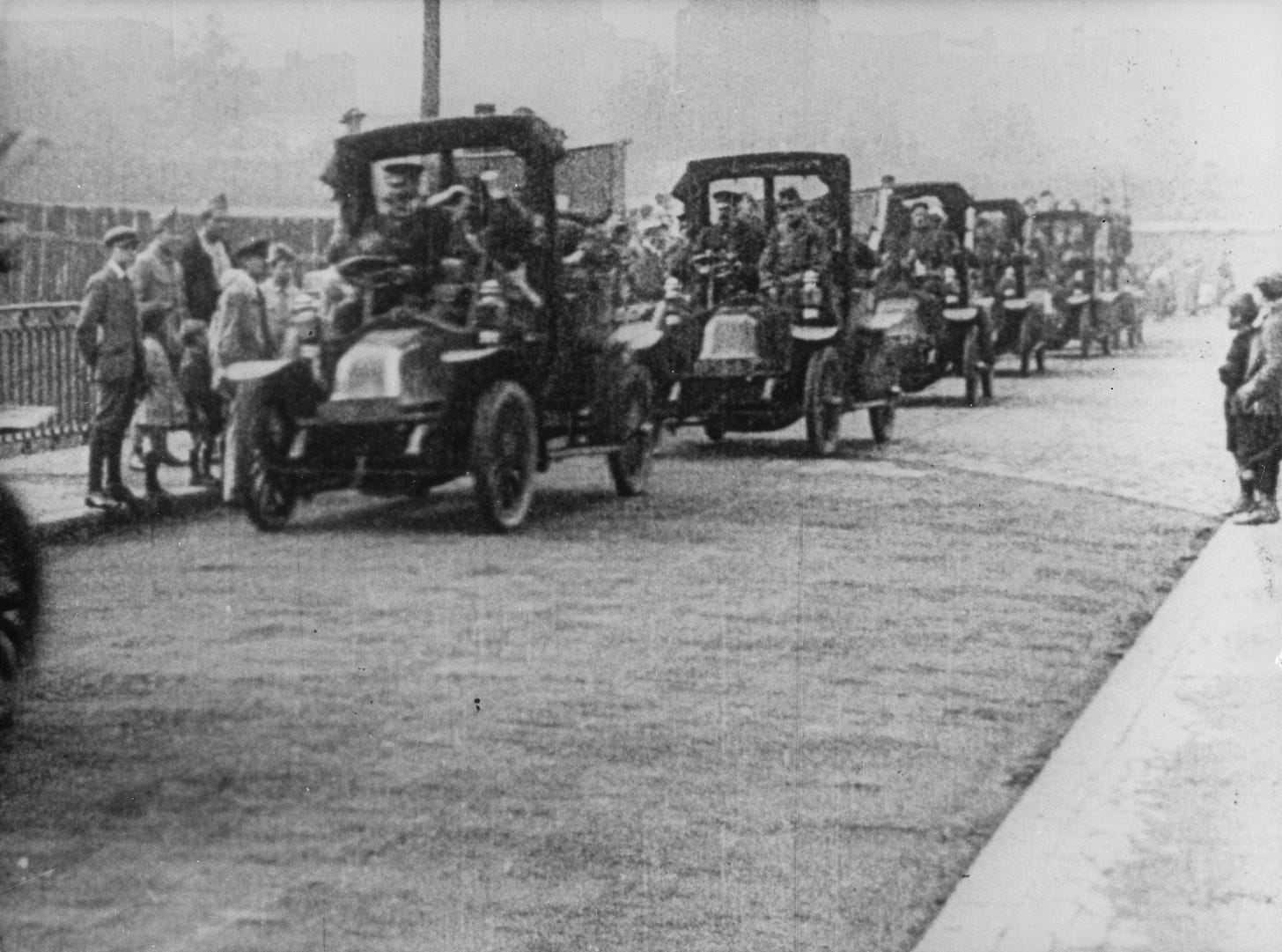An Army of Taxis Helped France Win World War I
But they were better at building morale than turning the tide of battle
by MATTHEW GAULT
It was Sept. 6, 1914 and the German army was only 30 miles east of Paris. The Germans thought the Great War would be fast, short and brutal. They had no reason to believe otherwise.
In just a few months, Berlin had pushed through Belgium and into France. Its war machine crushed all opposition. A month before, the French army had lost 27,000 soldiers killed in one day during the Battle of Frontiers. The speed and power of the German army horrified French commanders.
Another massive battle was taking shape in the farmlands east of Paris near the Marne River. France knew that if it lost there, the Germans would surround Paris and win the war.
France needed troops to the front line and it needed them fast. The trains and every available piece of military transport were already sending young men to the front. It wasn’t enough. But Paris did have taxis … thousands of them.
And so the taxis collected thousands of soldiers and rushed them to the front lines. Those needed reinforcements helped turn the tide of the battle, allowing the French army to beat back the Germans. Taxis saved Paris.
That’s the story, but the story is mostly myth.
In France, the tale of the taxis of Marne is an important one. The Museum of the Great War—located just outside of Marne—has one of the cabs on display. A memorial, complete with a taxi carved out of rock, stands in Paris as a memorial to the event. Authors have written dozens of books—both fiction and historical—about the taxis.
But the reality is that around 10,000 taxis operated in Paris. Of that, only 3,000 were available. The drivers of the other 7,000 cabs were off fighting the war. Sometimes, the authorities had to pull fares from the cars and force the drivers into military service.
On the night of Sept. 6, the taxis collected outside of Place des Invalides and collected the troops. The cars were Renault AG1 Landaulets and they carried five men each and maxed out at 25 miles per hour.
The military instructed the drivers to ferry troops to the front in a single file line. It was the middle of the night and the drivers kept their headlights off, and their tail lights lit. Each taxi followed the other.
The cabbies were pissed. The war was dangerous and deadly, and many of the drivers thought they might die. They also wanted to know if the military would pay them for the excursion. Many of them left their meters running and later billed the French military for their service—not the noble act of self-sacrificing cabbies.
The famed taxis of Marne transported around 5,000 troops to the battle. More than 80,000 French soldiers died during seven days of fighting. Those 5,000 troops were hardly enough to turn the tide. Worse, French commanders held most of the taxi troops in reserve.
The taxis of Marne didn’t save Paris from destruction. A German screw-up and a brilliant French general did.
The German high command had specific plans for how to win the war. They’d push their armies aggressively toward their targets, then surround and crush them.
It was an effective plan as long as everyone obeyed orders. The German war plan’s sheer scale also depended on strict timetables. If the French could delay the Germans long enough, their plans would go down the sink.
German Gen. Alexander von Kluck didn’t follow orders. During the battle, he decided to break off his forces and pursue routed French troops. The move exposed his flank and left a large gap between his forces and his nearest allies.
Gen. Joseph Joffre—the French commander-in-chief—saw the opening and took advantage of it. He convinced his British allies to join him in a counter-attack, and the two forces smashed into the side of the German army.
The Germans retreated and both sides dug trenches. The rapid and brutal advance of the Kaiser’s army was over and the conflict settled into the slow, horrifying trench war it’s remembered as today.
And the taxis had almost nothing to do with it.
But people needed a story and the taxis of Marne was a good one. Morale in the army and in the country was low. The Germans had pushed so close to Paris so quickly that many thought defeat was inevitable.
The idea of a line of taxis moving troops to the front in the dead of night was a fantastic story. It spoke to the French people’s ideal of solidarity and fraternity. It was a myth that gave them hope, and portrayed the French people as willing to come together and support each other in their darkest times.
In war, these kinds of myths are important. They give people hope and make them feel like the entire society, not just the military, is part of the war effort. The story of the taxis of Marne helped save Paris, not the cars themselves.
Read more:
Russian Forces Attacked Bahatyr In a Long Column of Civilian Cars
The town of Bahatyr is the next stop for Russian forces fighting to advance in southern Donetsk Oblast at the corner of the front line, where the line of contact bends from west-east to south-north and threads through Donetsk and neighboring Luhansk Oblasts.







